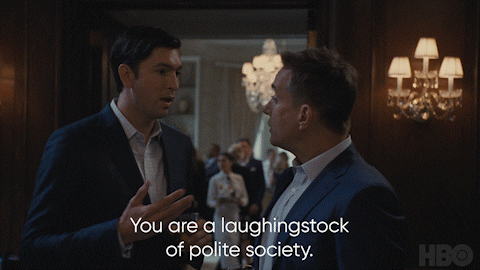The inner lives of the wealthy are TV ratings winners - but who’s having the last laugh?
Does guilty-pleasure TV protect the mega-wealthy?
I finished watching the latest season of White Lotus right around the time my latest book was published and it got me thinking about our obsession with stories about the mega-wealthy. And I began to question whether, by using TV shows to laugh at them, we are also anaesthetising ourselves to the very real danger the wealth divide presents to society.
Can guilty pleasure TV get in the way of us asking big, important questions about corruption, bribery and classism?
Social commentary might be awash with talk of the wealth gap and the oligarchy right now, but the place we’re most likely to encounter a deeper glimpse into the lives of the rich and famous is either through reality TV or via fiction and TV dramas such as White Lotus and Succession. And although shows like The Kardashians and Real Housewives purportedly give us a ‘warts and all’ peek behind the curtains, the reality of this ‘reality’ is that these shows are produced and curated by their stars along with those invested in their success – so we’ll never see what they truly don’t want us to - unless those darker stories are hijacked elsewhere for ratings.
When it comes to fictional TV or novels, the manipulation of the viewer’s gaze is a little different. We’re still invited in like voyeurs – but this time it’s to be part of an inside joke. And the general theme of these stories is that the lives of the uber-rich might look amazing, but once you get past the luxurious veneer, most of them behave terribly and they’re all miserable. And thank god for that, because while we know that it’s a fact of life that one woman’s necklace is another man’s yearly salary, it doesn’t mean we like it. Therefore, who doesn’t get some kind of satisfaction from watching the mega rich – with all their blind-spots and self-obsessions and careless trespassing on other’s lives – finally get skewered and outed for their distinctly human vulnerabilities.
Watching shows and reading novels along these themes can serve to dull the bitter taste of inequality, because they all tend to be laced with humour, even if it is often borne of incredulity at some kind of outrageous behaviour. From a safe distance we can witness the vagaries of such gilded lives with a knowing shake of our heads, because these fictionalised, obnoxious creatures cannot truly affect us. There’s a glinting edge beyond the humour, of course, but just as we’re heading towards a more painful place of outrage at the truths being offered, a character gets slapped in their face, or tells a story about swallowing their own sperm (hello, Succession), and the cold cruelty becomes spiked with absurd comedy again.
The observational genius of these shows – both in their creation and via the characters’ snappy dialogue – suggest they have something important to add to the cultural conversation, but, although the insight is fascinating, I’m not sure they leave us with much more than an enjoyable, perpetual mode of escapism. The usual takeaway from these hours of entertainment, beyond the drama and brief moments of self-realisation, is that once the dust settles, the wealthy’s antics and approach to life is likely to revert to business as usual. People do not change easily. The rich do not often voluntarily reject their fortunes or curb their excesses to pursue a happiness beyond financial means. And there’s very little the rest of us can do to impact these kinds of existences: even though they move around us and among us, affecting our lives in myriad ways, while remaining easily out of reach.
In my latest novel, I’ve taken up this theme to look at the myopic focus of the wealthy and the effects on those around them. The multimillionaire patriarch of my story, Jock Fisher, attempts to quickly intervene when his grandchildren go missing along with their au pair, the three of them vanishing without trace from a beach one morning. Jock comes striding into the scenario determined to throw money at it and make the problem go away, causing chaos without realising, because his hefty reward for information brings only more distraction and confusion in the first important hours of the investigation. Jock is self-deluded and arrogant, but because my book is a thriller, I don’t need to lighten the impact of his actions or play his scenes for laughs.
Can such stories contribute anything more than holding up a mirror to the growing wealth divide? Perhaps if there’s a greater purpose for exposing the rancorous underbelly of the lives of the rich, then our voyeurism is entirely the point. Unless something fundamental changes in the structure of our society then most of us are left with little to do except look in – if we’re invited – while consoling ourselves that although money can be used to manipulate and harm as well as heal, it doesn’t guarantee happiness. For these stories all adeptly and repeatedly convey that the accumulation and spending of money can only buy the temporary, artificial dopamine hit of wellbeing that leaves as quickly as any other drug high. The grossness of wealth therefore leads only to shiny artifice, and beyond that the super-rich are left dealing with the same realities and fallibilities as the rest of us.
Except, sometimes, this wealth reaches a point where it’s used to pay someone’s way out of trouble or criminal offences, to sway voters, win elections, bribe officials, and generally turn an unrelenting tide in the favour of a privileged few. The fictionalised wealthy may be amusing at times, and reality TV stars deemed harmless forms of entertainment, but they can’t become a panacea for what’s actually happening in our reality, because there’s nothing banal or funny about that. When it comes to stories of the wealthy, we might need some light relief, but not at the expense of our constant clear-sightedness too.
Have you read books or watched shows about the inner lives of the rich lately? What are your thoughts? Let me know in the comments.
This week the discussion around AI has been hot and I have some thoughts around this too! So I wrote a bonus post for my Resilient Author subscribers as an opportunity for us all to pause and engage meaningfully with both sides of the discussion.
However, readers are going to be a critical part of this discussion, as it’s readers who will determine where the money goes. What do you think. Do you want your books to be human-authored - or are you open to the possibilities of AI?
Finally, I’m particularly excited about book releases coming this month from two of my favourite international authors: Taylor Jenkins Reid’s Atmosphere (which I’m reading now), and Lisa Jewell’s Don’t Let Him In. And here in Australia, thriller writer Ashley Kalagian Blunt has a new Audible original out called Like Follow Die, which sounds really gripping. I’m also keen to get to Michelle de Kresner’s Theory and Practice, after her Stella win and inspiring acceptance speech. And my fellow WA author, Holden Sheppard, the man behind the story of hit TV series Invisible Boys, has just released his new novel King of Dirt. There’s already plenty to keep us captivated during the colder months.
Until next time, wishing you hours of happy reading!
Sara






TBH, I've been a fan of BOLD AND THE BEAUTIFUL since the 90s, partly because the characters have no friends and just keep marrying each other!! But at least the show has some cultural diversity, though no religous, gender, disability and rarely socio-economic, unless someone is being saved.
What gets me with some of these reality shows is how loud and rude some of these' members of polite society' are in public. I know things are edited to make good television, but it still had to happen to be edited. If they have businesses how can they ever be taken seriously.